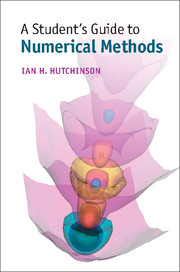B. J., Alder and T. E., Wainwright (1957), Phase transition for a hard sphere system, J. Chem. Phys. 27, 1208–1209.
R., Barrett, M., Berry, T. F., Chan, et al. (1994), Templates for the Solution of Linear Systems: Building Blocks for Iterative Methods, second edition, SIAM, Philadelphia, which is available at http://www.netlib.org/linalg/htmLtemplates/report.html.
C. K., Birdsall and A. B., Langdon (1991), Plasma Physics via Computer Simulation, IOP Publishing, Bristol.
S., Brandt (2014), Data Analysis: Statistical and Computational Methods for Scientists and Engineers, fourth edition, Springer, New York.
S. C., Chapra and R. P., Canale (2006), Numerical Methods for Engineers, fifth edition, or later, McGraw-Hill, New York.
J. H., Ferziger and M., Peric (2002), Computational Methods for Fluid Dynamics, third edition, Springer, Berlin.
A., Hébert (2009), Applied Reactor Physics, Presses Internationales Polytechnique, Montréal.
R. W., Hockney and J. W., Eastwood (1988), Computer Simulation using Particles, Taylor and Francis, New York.
T. J. R., Hughes (1987), The Finite Element Method, Prentice Hall, Englewood Cliffs, NJ.
C. P., Jackson and P. C., Robinson (1985), A numerical study of various algorithms related to the preconditioned conjugate gradient method, International Journal for Numerical Methods in Engineering 21, 1315–1338.
F., James (1994), Computer Physics Communications 79, 111.
S., Jardin (2010). Computational Methods for Plasma Physics, CRC Press, Boca Raton.
B. E., Launder, G. J., Reece, and W., Rodi (1975), Progress in development of a Reynolds-stress turbulence closure, Journal of Fluid Mechanics 68, 537–566.
R. J., Leveque (2002), Finite Volume Methods for Hyperbolic Problems, Cambridge University Press, Cambridge.
M., Luscher (1994), Computer Physics Communications 79, 100.
G., Markham (1990), Conjugate gradient type methods for indefinite, asymmetric, and complex systemsIMA Journal of Numerical Analysis 10, 155–170.
U., Piomelli (1999), Large-eddy simulation: achievements and challenges, Progress in Aerospace Sciences 35, 335–362.
W. H., Press, B. P., Flannery, S. A., Teukolsky, and W. T., Vettering (1989), Numerical Recipes, Cambridge University Press, Cambridge.
G. D., Smith (1985), Numerical Solution of Partial Differential Equations, Oxford University Press, Oxford, p. 275ff.
G., Strang and G. J., Fix (1973, 2008), An Analysis of the Finite Element Method, Reissued by Wellesley-Cambridge Press, Wellesley, MA.





